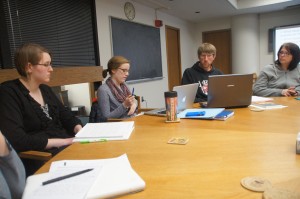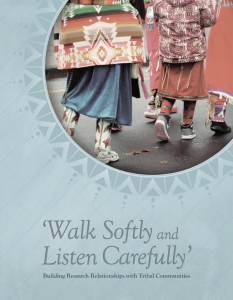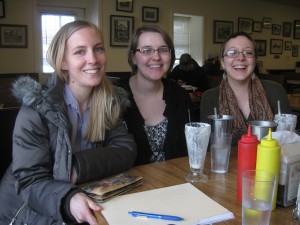Over the course of the last few weeks of class, we TLAM students have had the opportunity to engage with a variety of guest speakers to explore a host of topics relating to tribal libraries, archives, and museums. We have devoted a great deal of classroom time to improving our understanding of the history, culture, language, and political and cultural sovereignty of tribal nations.

This week’s class was slightly different from the others in that we did not host an invited speaker or take a trip to a special event this go around. Instead, we took a moment to pause and reconnect with each other as a group. We devoted this class period to discussing how the themes of the previous weeks connect with the service-learning projects that we are now embarking upon.
The students in TLAM are of diverse academic backgrounds, and while most of us are SLIS students, not all of us have had previous experience in working with tribal communities. For this reason, the readings and discussions from the last few weeks have been invaluable to our building a solid background in historical and contemporary issues facing these communities.

Of our readings for the week, one in particular titled ‘Walk softly and listen carefully’: Building research relationships with tribal communities,’ served to further emphasize the importance of this preparatory education. The paper explains that researchers and their academic institutions must “commit to a process of learning how the cultures, sovereignty, and experiences of AI/AN (American Indian/Alaska Native) people shape the context of research” (p. 11) before and during their interactions with native communities.
This commitment is crucial given the impact of unethical research practices which have adversely affected so many native peoples in the past. We as TLAM students have the responsibility to form positive and mutually beneficial partnerships with the communities we will work with over the course of the semester (and beyond!).
Of course, we can’t develop successful partnerships behind a desk – we need to put our learned practices into action, and we need to expand our efforts to engage with our TLAM affiliated tribal communities! So, we must now begin to shift our focus more to our service-learning projects.
At this point in the semester, many trips to visit communities have been planned and many developmental meetings have taken place to establish what type of project each student group will be undertaking. Because we are orienting these projects to serve the needs of the individual tribes that we work with, each one is taking shape a different way.
The group that I am a part of has just begun our work with the Ho-Chunk Learning Center in Baraboo, WI. My groupmates, teachers, and I recently had our first meeting with members of the Ho-Chunk Language Division and Learning Center staff to discuss potential projects which will benefit the patrons of the Learning Center library.

It was fantastic for our group to visit the center and surrounding facilities of the larger Wellness Center which houses it, and to be able to catch a glimpse of the many quality services that the center provides to the children and families of the Baraboo area.
Our meeting involved a discussion of projects ranging from the archiving and cataloging of library materials, to equipment training for students and teachers, to developing fundraising strategies which will support future student projects. We are excited to continue to develop this and other exciting TLAM service-learning projects as the semester goes on, and are looking forward to updating our readers in the process!
-Sarah Lundquist
Readings:
Kajner, T., Fletcher, F. & Makokis, P. (2012). Balancing head and heart: The importance of relational accountability in community-university partnerships. Innovative Higher Education, 37, 4, 257-270.
NCAI Policy Research Center and MSU Center for Native Health Partnerships. (2012). ‘Walk softly and listen carefully’: Building research relationships with tribal communities. Washington, DC, and Bozeman, MT.
Treuer, A. (2012). Everything you wanted to know about Indians but were afraid to ask. Saint Paul, MN: Borealis Books. 39-67.
